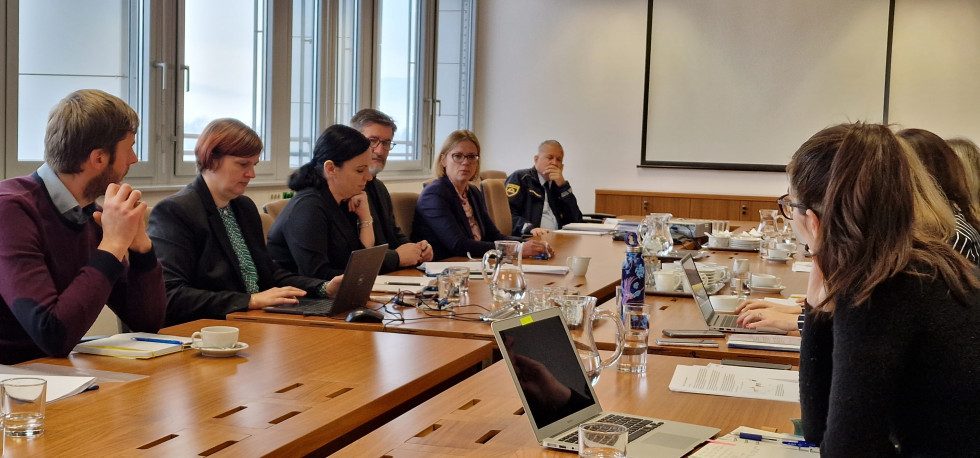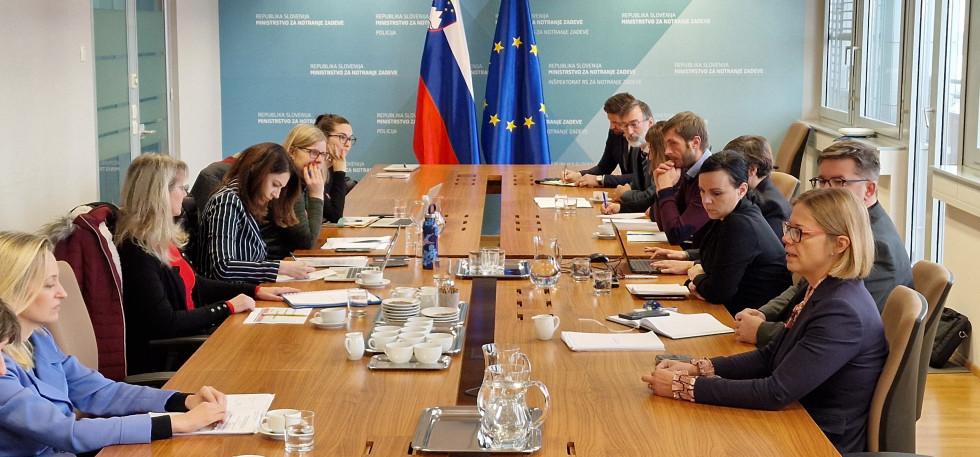Minister Sanja Ajanović Hovnik: The aim is to prepare an effective migration strategy
We are preparing a new migration strategy
The participants were greeted at the beginning by the Minister of Public Administration in her capacity as Minister of the Interior, Sanja Ajanović Hovnik. "At the Ministry of the Interior, we have set ourselves the goal of preparing an effective migration strategy, which must also be supported by an integration strategy." In the past, the Minister recalled, we have prepared good strategies, but have not implemented them, so the successful implementation of the document we are preparing is an important priority for the Ministry in 2023. In our ageing society, in which 40,000 people retire each year and fewer than 20,000 enter the labour market annually, there is a gap between what we can do as a country and a society, and what the needs of the economy and the community as a whole are. "If we want to develop, we need to take concrete steps. The Balkan pool is practically empty, so we need to identify the people we want to attract to come and work here, and then successfully integrate them into society." The Minister pointed to the German model as an example of good practice, where an intensive integration policy is being implemented.
The Working Group, which has a coordinating and consultative role, is headed by Branko Lobnikar, State Secretary at the Ministry of the Interior, who presented the work method for the preparation of the new strategy. It will cover key areas such as legal migration, effective integration into society, prevention of illegal migration, and effective international protection procedures that respect human rights.
"The document we want to prepare will consist of two parts. The first part will feature a programme and will be a reflection on the strategic management of migration, while the second part will focus on implementation – the ”action plan” for the programme," explained Mr Lobnikar, adding that the different task holders will also be determined. "We want to ensure synergies between all stakeholders in this area," he said, adding that the Working Group is expected to produce the document in the first quarter of 2023.
Members of the Working Group include representatives of the ministries active in the fields of labour, economy, culture, foreign affairs, finance, justice, education and defence, the Police, the Slovenian Intelligence and Security Agency, the Government Office for the Support and Integration of Migrants, and the Institute of Macroeconomic Analysis and Development. The Working Group also includes representatives of civil society, namely representatives of the Legal-Informational Centre for NGOs, the Counselling Service for Workers, the Research Centre of the Slovenian Academy of Sciences and Arts, and the Faculty of Criminal Justice and Security.

Meeting of the Migration Strategy Working Group | Author Ministry of the Interior
Amendment to the Foreigners Act
In parallel with the preparation of the new Migration Strategy, we are also working on the revision of the Foreigners Act.
In order to relieve the overburdened administrative units, we are preparing an amendment to the Foreigners Act under the urgent legislative procedure, which will primarily address the issue of territorial jurisdiction. In line with the current situation in administrative units, which are experiencing an extremely high number of new cases relating to foreigners, and where the procedures for issuing residence permits are taking a long time, and given the fact that administrative units, especially those in major urban centres, are experiencing a large number of delays in the settlement or issuance of residence permits, with particular emphasis on the backlog in the issuing of single residence and work permits, the proposed amendment contains a solution which will allow, in exceptional cases and under predefined conditions, the transfer of local competence from overburdened administrative units to those that are less burdened. This will speed up the processing of applications for residence permits and residence registration certificates, and contribute significantly to reducing the considerable backlog in this area.
Taking into account the principle of the economy of the administrative procedure, and the principle of the protection of the rights of parties and the protection of public interest, and with a view to eliminating unnecessary administrative obstacles, the amendment to the Foreigners Act will also contain other solutions that will speed up procedures for issuing residence permits and residence registration certificates (the proposals aim to enable issuing extended temporary residence permits and permanent residence permits by post, the retention of fingerprints submitted in the process of issuing the first temporary residence permit also for the purpose of use in the process of extending the temporary residence permit, the abolition of the requirement for a written request from the administrative unit to complete the application with fingerprints, the possibility of linking the register of foreigners with the register of final indictments and non-final judgments kept by the courts).
The amendments would also abolish the requirement of Slovenian entry-level language proficiency for the extension of a temporary residence permit for the purpose of family reunification, and reintroduce Slovenian language courses for all categories of foreigners who were entitled to Slovenian language courses before the adoption of the Act amending the Foreigners Act in 2021.
The amendment, which is still undergoing inter-ministerial coordination, is expected to be adopted in the first quarter of this year.
We are also preparing an amendment to the Foreigners Act, which is expected to be adopted through the ordinary legislative procedure in the second half of 2023. It will contain the following main solutions:
- the transposition of the new EU Blue Card directive into national law. This makes it compulsory to recognise professional experience acquired by a foreigner in a specific profession as proof of high-level professional qualifications. Beneficiaries of international protection and seasonal workers will also be eligible for an EU Blue Card. The amendment also introduces easier conditions for mobility within EU Member States, for both short-term and long-term mobility;
- the introduction of changes necessary to comply with the obligations under the EU Regulation establishing the European Travel Information and Authorisation System (ETIAS);
- the introduction of a temporary residence permit for digital nomads, ensuring the implementation of the measure prepared by the Strategic Council for Digitalisation to regulate the status of digital nomads.


